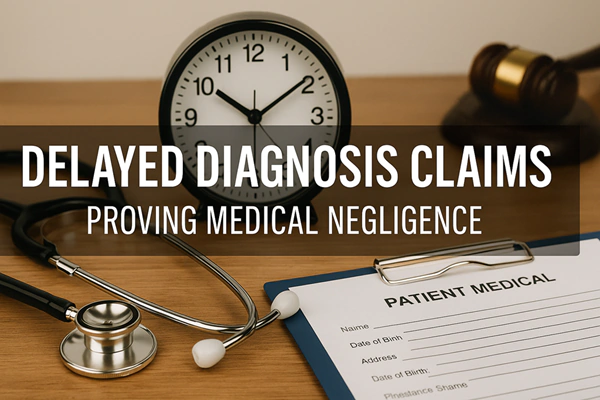When you visit a doctor or hospital, you trust the medical professionals to identify and treat your condition in a timely manner. But what happens if that diagnosis is delayed, and your health suffers as a result?
In many cases, a delayed diagnosis can have serious consequences, from worsening symptoms to life-altering complications. If the delay was caused by a medical professional’s negligence, you could be entitled to compensation.
Here’s what you need to know about delayed diagnosis claims and how to prove medical negligence in the UK.
What is a delayed diagnosis?
A delayed diagnosis occurs when a healthcare provider fails to identify a medical condition within a reasonable timeframe. This could mean:
- A condition is completely missed during initial consultations
- Test results are overlooked or misinterpreted
- Symptoms are dismissed or attributed to the wrong cause
- There is an unreasonable delay in referring the patient to a specialist
Common examples include delays in diagnosing cancer, meningitis, heart attacks, strokes, or infections like sepsis, conditions where time is crucial.
When Is a Delayed Diagnosis Considered Medical Negligence?
Not every delayed diagnosis amounts to medical negligence. For a claim to succeed, you must prove the following:
- Duty of care: The medical professional owed you a duty of care (this is usually straightforward in an NHS or GP setting).
- Breach of Duty: The care provided fell below an acceptable standard. For example, another competent doctor would have made the diagnosis sooner.
- Causation: The delay directly caused you harm that could have been avoided, or made your condition significantly worse.
- Loss: You suffered financial loss, pain, or long-term damage as a result.
Examples of medical negligence due to delayed diagnosis
- A GP fails to refer a patient with clear cancer symptoms for further investigation.
- Blood test results showing signs of infection are ignored, leading to sepsis.
- A radiologist misreads an X-ray, delaying treatment of a broken bone or tumour.
- A stroke patient is not given clot-busting treatment in time due to delayed diagnosis.
How to Prove a Delayed Diagnosis Claim
Medical negligence claims can be complex, and evidence is key. Here’s how you can build a strong case:
1. Get your medical records
These will show what decisions were made, when appointments took place, what tests were done, and the results.
2. Seek an independent medical expert
Solicitors will arrange for a specialist to review your case. They will assess whether the care you received fell below acceptable standards.
3. Show the impact of the delay
You’ll need to demonstrate how the delay changed your outcome, e.g. requiring more invasive treatment, longer recovery, or lower survival rates in cancer cases.
4. Document financial and emotional losses
This can include:
- Loss of earnings
- Travel expenses for extra treatment
- Care and support costs
- Pain, suffering and loss of amenity
How long do you have to make a claim?
In most cases, you have three years from the date of the negligence or from when you first realised something was wrong. This is known as the date of knowledge.
For children, the time limit starts when they turn 18. For those lacking mental capacity, the time limit may be extended.
Can you claim against the NHS?
Yes. You can bring a claim against NHS hospitals, GPs, and other NHS services. These claims are handled by NHS Resolution, the organisation that manages clinical negligence claims on behalf of the NHS.
You can also bring a claim against private healthcare providers.
No win, no fee medical negligence claims
At Marley Solicitors, we offer no win, no fee arrangements for eligible medical negligence claims. This means you won’t pay any legal fees unless your claim is successful, removing the financial risk of pursuing justice.
Get expert help today
If you or a loved one has suffered due to a delayed diagnosis, don’t suffer in silence. A successful claim could provide the financial support you need and hold the healthcare provider accountable.
Contact Marley Solicitors today for a free, no-obligation consultation regarding medical negligence in Preston. We’re here to listen, advise, and fight for your right to proper care.


